Dr Lingyun Xiao, of the Department of Health and Environmental Sciences, XJTLU, talks to us about her big cat research.
https://www.xjtlu.edu.cn/en/news/2020/11/biodiversity-snow-leopards-with-dr-lingyun-xiao
By Patricia Pieterse
Dr Lingyun Xiao, of the Department of Health and Environmental Sciences, XJTLU, talks to us about her big cat research.
https://www.xjtlu.edu.cn/en/news/2020/11/biodiversity-snow-leopards-with-dr-lingyun-xiao
By Patricia Pieterse

The Snow Leopard Network is pleased to announce our seventh SLN webinar of 2020. SLN is dedicating the month of November to exploring Genetics, in particular in support of snow leopard conservation. We already have launched the November training initiative with a module on genetics. The Webinar allows us to bring emphasis on this topic with a wider audience and drawing on experiences from different endangered species.
We are delighted to welcome Dr. Uma Ramakrishnan for this thematic discussion on how genetics can be brought to bear more effectively on specific aspects of snow leopard conservation. Uma has a wealth of knowledge and experience working on endangered species and developing methodological approaches for conservation. Uma will be joined by Dr. Byron Weckworth, Director of Panthera’s Snow Leopard and Conservation Genetic programs, as principal discussant.
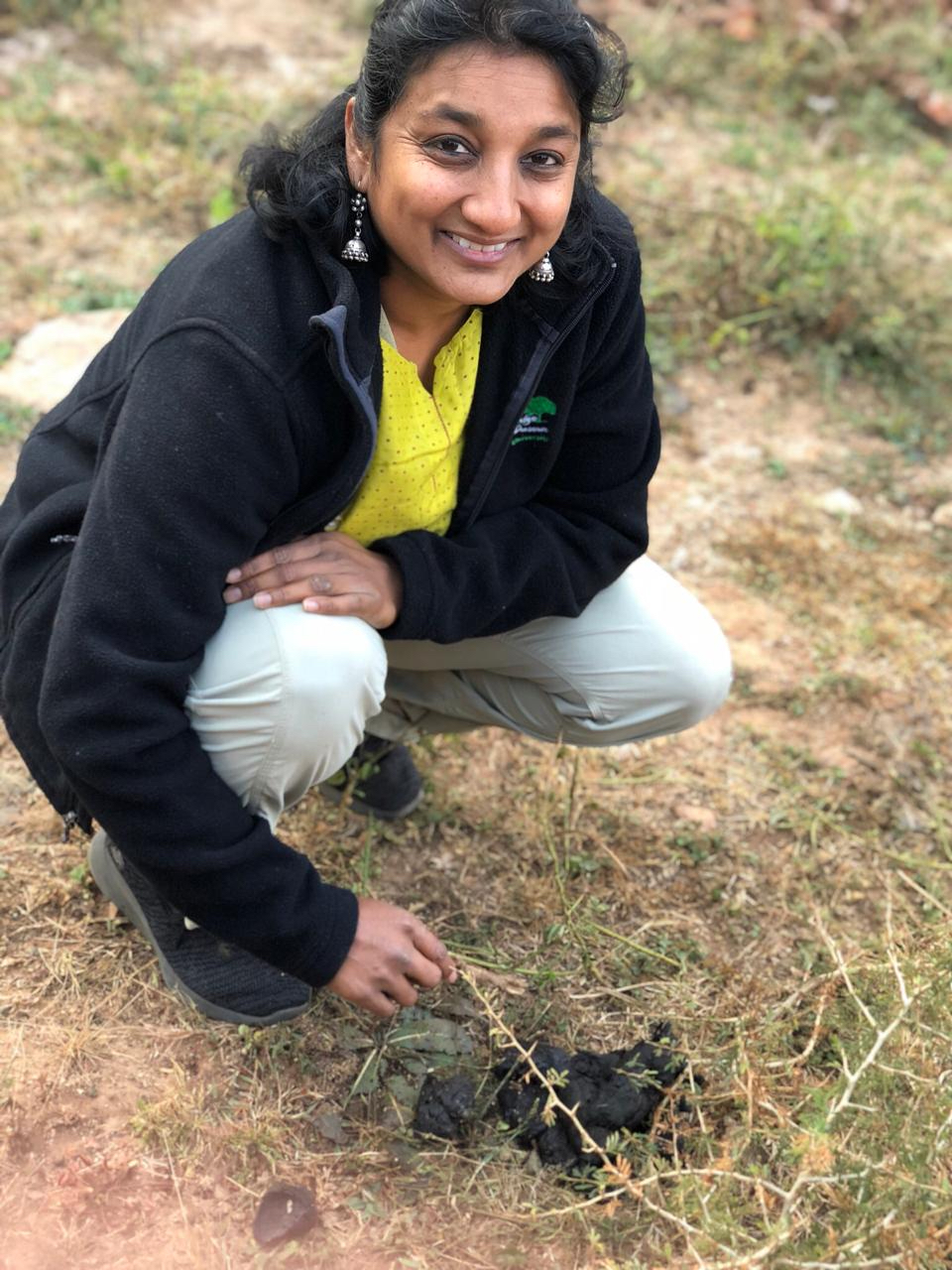
Date/Time: 19:30 India time, Friday, November 20th (Please log into the meeting 5 min early to set up)
Location: ZOOM, to join this talk REGISTER HERE
Please note:
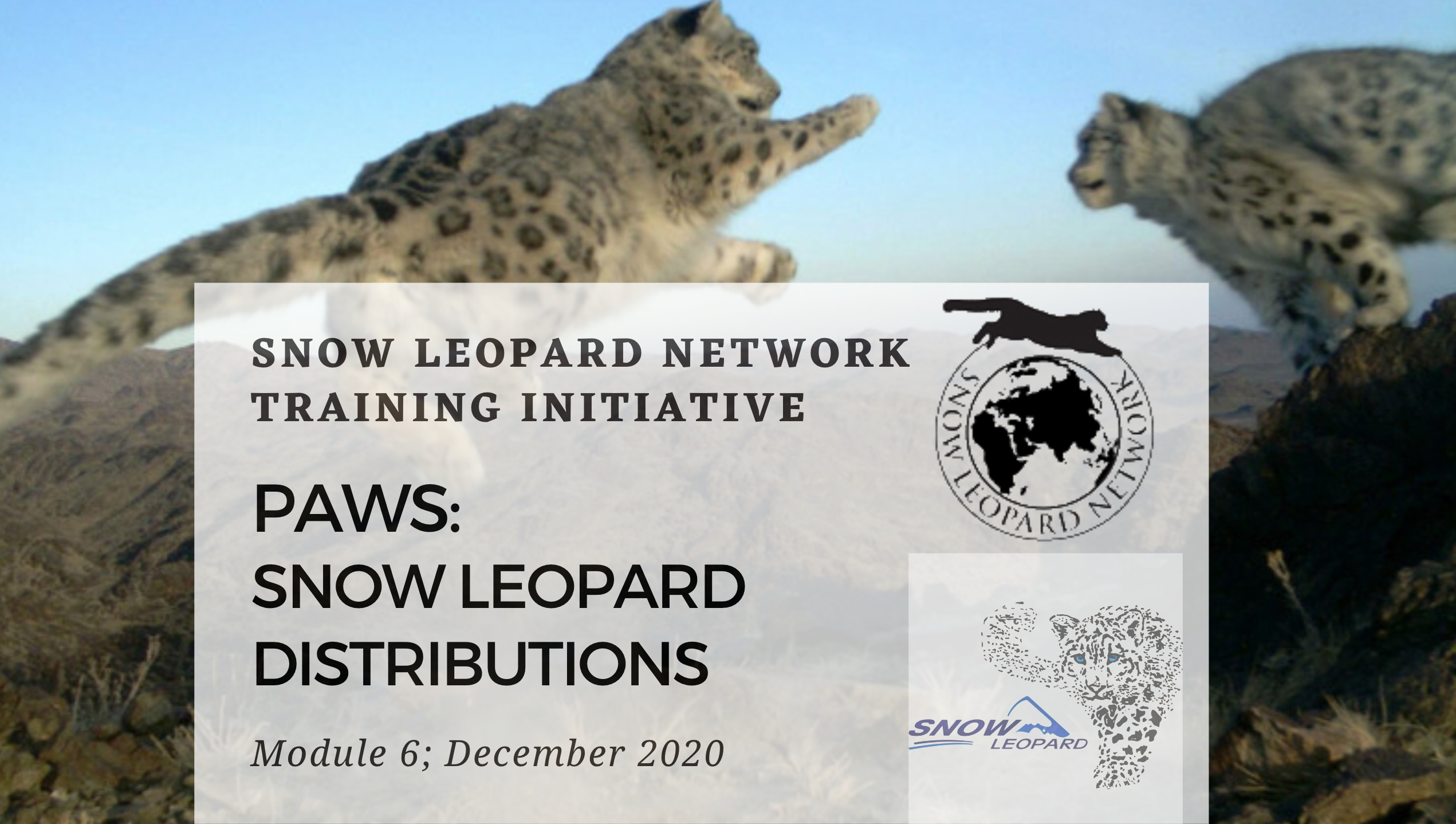
We are thrilled to build on Module 1 of the SLN training initiative which focussed on camera trapping surveys to assess snow leopard abundance. This coming Module focusses on assessing snow leopard or prey distributions across landscapes. Both Module 1 and 6 aim to support the PAWS (Population Assessing of the Worlds Snow leopards) initiative and are offered thanks to the GSLEP Programme partnership. If you have the opportunity please join us for this 2nd PAWS training module.
Course Content
To estimate how many snow leopards there are, we also need to know where they are. Assessment of the status and distribution of rare and elusive species such as the snow leopard is challenging. Recent surveys in some parts of the snow leopard range have indicated that our understanding of the species’ distributions might not be as accurate as previously thought. To minimize subjectivity and maximize replicability and reliability, it is important to address imperfect detection probability in estimating species distribution.
Occupancy surveys can be implemented with a variety of sampling methods, spatial extents, and effort levels. Assessing the distribution of a species at local and regional scales may also help track changes over time and gauge the effects of potential threats by comparing local extinctions and colonizations over time. Probability of site use
or occupancy, as a function of habitat can also help define strata for which specific intensive sampling strategies using spatial capture recapture methods can be developed.
Module 6 aims to equip participants with the knowledge and tools to plan and carry out snow leopard distribution survey across large areas using interviews of key informants, sign surveys, camera traps and genetic surveys. We will discuss means and workflows to collect, process and organize data in a way that it can be used for occupancy analyses. Additionally, we will be sharing the latest Macro level methods and tools recommended by the PAWS GSLEP Programme. The Macro Level design tools provide recommendation for assessing snow leopard distribution across large area (5,000 sq km) and how to select sites for more intensive surveying. Distribution estimates of occupancy can be obtained by conducting interview surveys, camera trapping or sign based occupancy methods. The module will cover key concepts underlying occupancy models and taking into account detection probability.
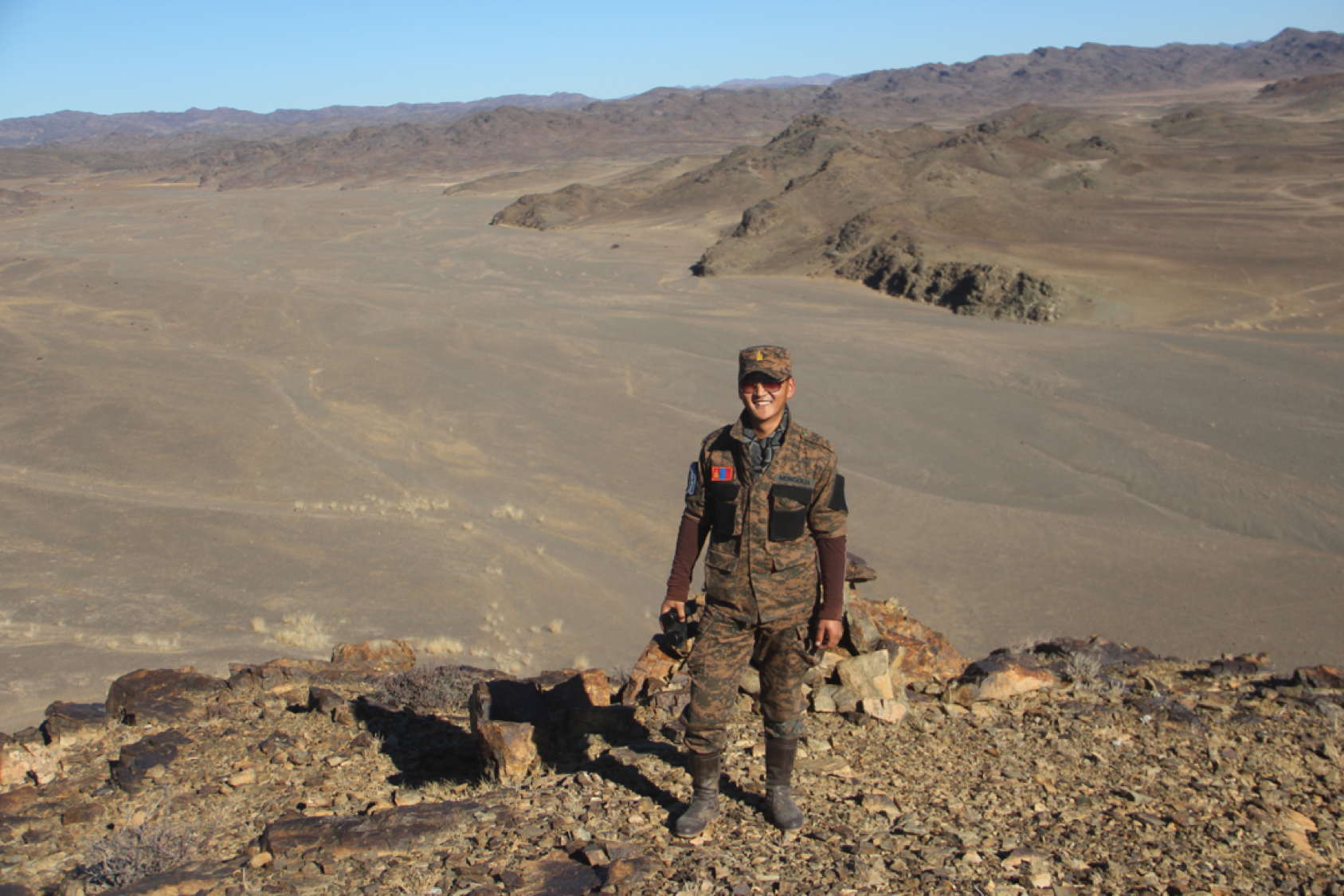
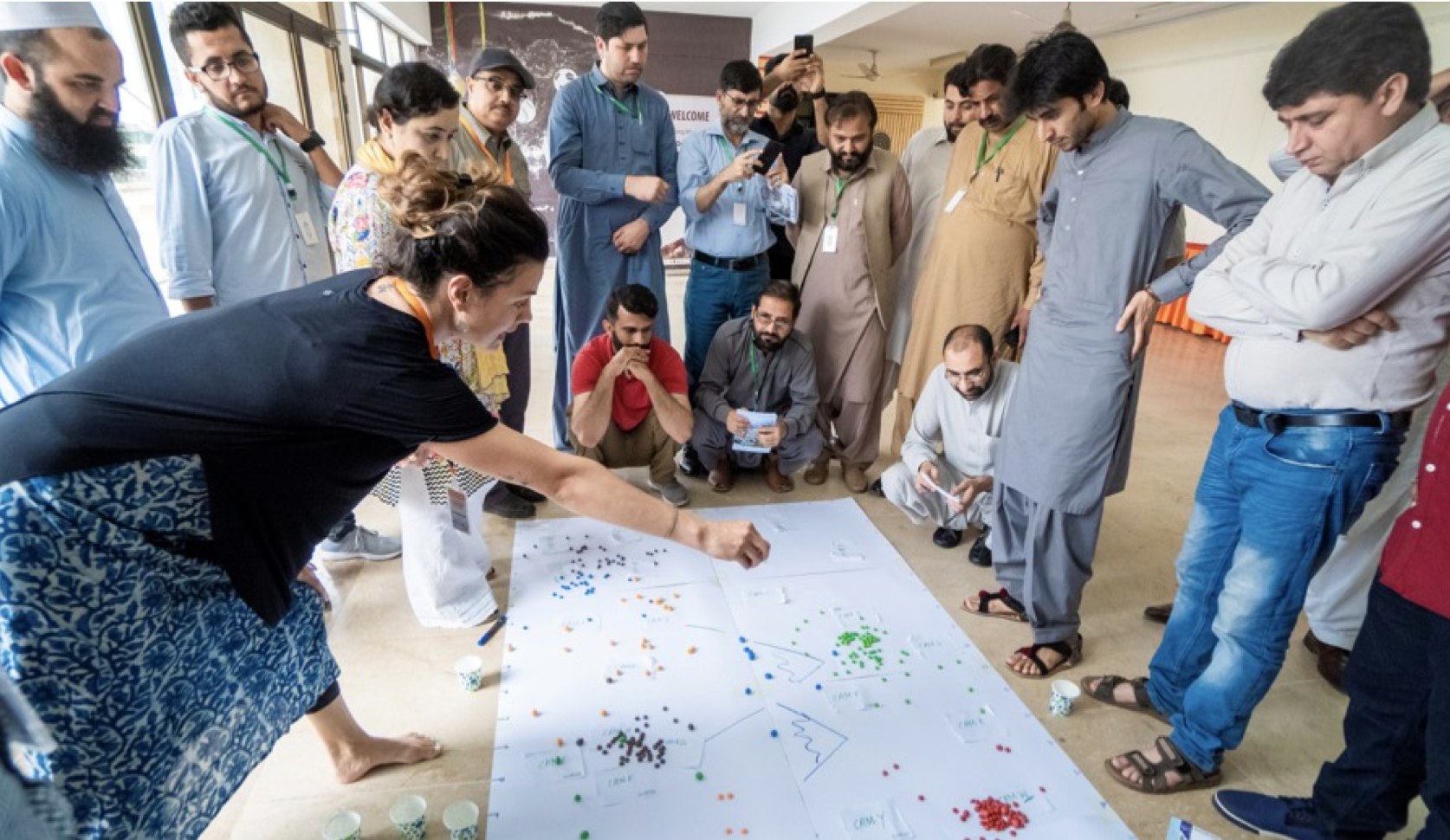
Meet the Trainers
Dr. Koustubh Sharma: Koustubh is the International Coordinator of the Global Snow Leopard and Ecosystem Protection Program and a Senior Regional Ecologist with the Snow Leopard Trust. He, along with Justine help coordinate Population Assessment of the World’s Snow Leopards (PAWS) as a GSLEP initiative. He holds a PhD in Wildlife Zoology from Mumbai University, and a Masters degree in Physics. He has undergone training on spatial capture recapture methods at the Centre for Research in Ecological and Environmental Research (CREEM), University of St. Andrews, and on advanced applications of ArcGIS by ESRI. He has been involved with colleagues and partners in developing training tool-kits and delivering training workshops for a suite of ecological methods relevant for snow leopard research and conservation.
Dr. Justine Shanti Alexander: Justine is the Executive Director of the Snow Leopard Network. She provides technical support to GSLEP for the population assessment of the worlds snow leopards (PAWS) and other efforts related to snow leopard conservation. Justine also acts as the Regional Ecologist for the Snow Leopard Trust and supports research and conservation work across the snow leopard range. She holds a PhD in snow leopard population assessments from Beijing Forestry University and a MSc in Conservation Science from Imperial College London.
Dr. Ian Durbach: Ian is part statistician, part operations researcher. He is a research fellow at the Centre for Research into Ecological and Environmental Modelling at the University of St Andrews, where he currently works on two projects: modelling behavioural responses of whales to sonar, and designing the camera trap component of the first range-wide survey of snow leopards. He is also adjunct associate professor in the Department of Statistical Sciences at the University of Cape Town, where he is part of the Centre for Statistics in Ecology, the Environment, and Conservation (SEEC). Ian is also interested in multi-criteria decision modelling (MCDM) for supporting decisions between options whose outcomes are uncertain, and applying machine learning to ecological classification tasks involving images, audio, and video.
Criteria for participation
Planned Schedule
Deadline for Applications
Kindly note these trainings are free to participants. Also that the trainers are sharing their time and knowledge with us as a gesture to the Network and to snow leopards!
Last Friday, on International Snow Leopard Day, Snow Leopard Conservancy hosted a virtual event to highlight the work of the Land of the Snow Leopard Network.
SLC was joined by key members of the Land of the Snow Leopard Network from Central Asia. This gathering highlighted the interconnection of Indigenous People and the sacred Snow Leopard.
Link to YouTube:
The Land of the Snow Leopard Network is an unprecedented conservation initiative, a groundbreaking collaboration between Western conservation science and Indigenous Traditional Knowledge, with the goal of creating pathways for Indigenous involvement in the conservation of snow leopards.For more information please visit
https://landofsnowleopard.org/
and
https://snowleopardconservancy.org/land-of-the-snow-leopard/
.
Thank you very much.
A virtual event for GSLEP
Pallas’s cats (also known as manul) share much of their range with snow leopards and the two species face similar threats. Addressing threats to Pallas’s cats can therefore be extended to snow leopards and vice versa and joint conservation efforts will be beneficial for both species and the ecosystems at large. The Pallas’s Cat International Conservation Alliance (PICA for short) invites you to join them in the discussion on how Pallas’s cats and snow leopards are good indicator species for different parts of the ecosystem and how joint conservation efforts will have synergistic effects that will benefit snow leopards, Pallas’s cats, and the mountain ecosystem at large. The meeting took place at the virtual venue (http://join.globalsnowleopard.org) on Monday 26 Oct, 2020, between 12:00 and 14:00 Bishkek time.
You can watch it here – https://youtu.be/zZpGULP0bc4

On International Snow Leopard Day, join conservationist Dr Jonny Hanson for an interactive and engaging exploration of the science of snow leopards. From natural selection and camera trapping to social surveys and ecosystem services, learn about the natural history of and threats to this elusive big cat, its coexistence with local communities …
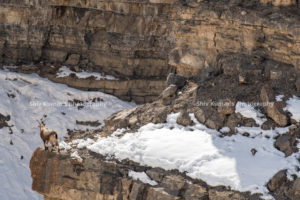
Please find details below about a new article that has been added to our Bibliography:
Title: Detection and Genetic Characterization of Viruses Present in Free-Ranging Snow Leopards Using Next-Generation Sequencing
Authors: Johansson, O., Ullman, K., Lkhagvajav, P., Wiseman, M., Malmsten, J., Leijon, M.
Abstract: Snow leopards inhabit the cold, arid environments of the high mountains of South and Central Asia. These living conditions likely affect the abundance and composition of microbes with the capacity to infect these animals. It is important to investigate the microbes that snow leopards are exposed to detect infectious disease threats and define a baseline for future changes that may impact the health of this endangered felid. In this work, next-generation sequencing is used to investigate the fecal (and in a few cases serum) virome of seven snow leopards from the Tost Mountains of Mongolia. The viral species to which the greatest number of sequences reads showed high similarity was rotavirus. Excluding one animal with overall very few sequence reads, four of six animals (67%) displayed evidence of rotavirus infection. A serum sample of a male and a rectal swab of a female snow leopard produced sequence reads identical or closely similar to felid herpesvirus 1, providing the first evidence that this virus infects snow leopards. In addition, the rectal swab from the same female also displayed sequence reads most similar to feline papillomavirus 2, which is the first evidence for this virus infecting snow leopards. The rectal swabs from all animals also showed evidence for the presence of small circular DNA viruses, predominantly Circular Rep-Encoding Single-Stranded (CRESS) DNA viruses and in one case feline anellovirus. Several of the viruses implicated in the present study could affect the health of snow leopards. In animals which are under environmental stress, for example, young dispersing individuals and lactating females, health issues may be exacerbated by latent virus infections.
URL:https://snowleopardnetwork.org/bibliography/Johansson_et_al_virus_snow_leopards_2020.pdf
We wish to inform you that our Module 2 – SLN Training Initiative – Prey
Surveys is now available as an online toolkit for our members.
About this course:
Asia’s mountain ungulates– also known as the Mountain Monarchs of high
Asia- play an important role in maintaining ecosystems by influencing
vegetation structure and nutrient cycling. These include Argali (Ovis
ammon), Blue Sheep (Pseudois nayaur), Asiatic Ibex (Capra sibirica),
Urial (Ovis orientalis) and Markhor (Capra falconeri). However, owing to
their remote mountainous habitats and associated challenges in sampling,
there is a lack of information regarding their abundance, population
trends and ecology. There is a need for more information about the
population status of these ungulates, which carries special significance
in the protection of the snow leopard across its range.
Our Module 2 aims to equip participants with the knowledge and tools to
plan and carry out robust mountain ungulate surveys using the
Double-observer Method. We dive into understanding the fascinating
ecology of these species based on the latest research. The module is
divided into 4 parts and covers key concepts from planning surveys,
conducting them, analysing data, and using outcomes for conservation
action, publication and/or policy. Alongside we will have fascinating
talks by subject experts, sharing their experiences and outputs. This is
critical as conservation status assessment of any species requires
rigorous monitoring of their abundances, which done over time, can
provide knowledge of population trends.
This course was conducted live through on-line sessions with Snow
Leopard Network participants in August 2020. The training took place
over 4 sessions (each 2 hours) corresponding to key learnings necessary
for designing and carrying out double observer surveys to assess
ungulate abundance and density. The recordings from this live training
are now available below. Do follow the outlined structure of the course
as each session builds on each other. In total the course consists of 8
hours of video presentation and discussion.
This module has been co-created by a team of researchers and
practitioners from across the snow leopard range, including India,
Pakistan, Mongolia and China: Dr. Hussain Ali, Purevjav (Puji)
Lkhagvajav, Chagsadulam (Chagsaa) Odonjavkhlan, Dr. Lingyun Xiao and
Munib Khanyari. Together the module co-creators have worked to study and
protect mountain ungulates including Argali, Asiatic Ibex, Blue Sheep,
Markhor and Urial across India, Pakistan, Mongolia, China and
Kyrgyzstan.
The live training sessions were led by Munib Khanyari with the support
of a number of guest speakers (Chagsadulam (Chagsaa) Odonjavkhlan,
Abhirup Khara and Dr. Yash Veer Bhatnagar). Munib is currently a PhD
Candidate at the University of Bristol and Oxford University in the UK.
He works on understanding factors that affect mountain ungulate
populations in Central and South Asia.
Please access this online resource for practitioners here –
https://snowleopardnetwork.org